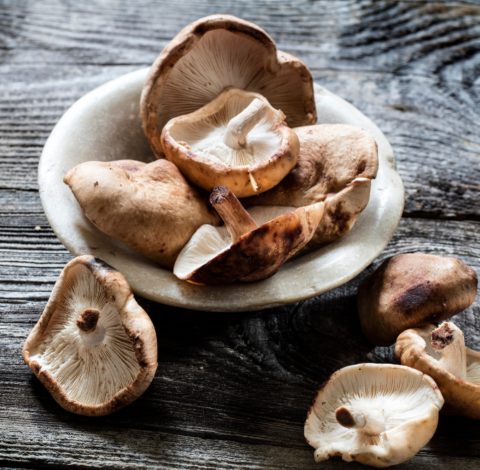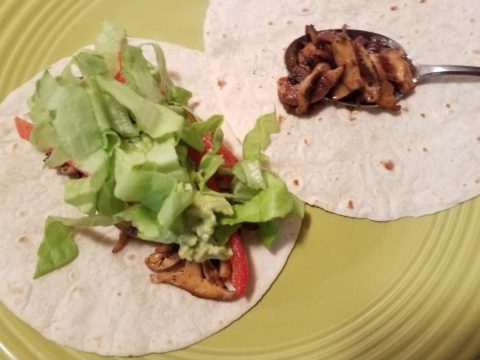By Stephen T. Sinatra, M.D., F.A.C.C., F.A.C.N., C.N.S., C.B.T.
Mushrooms…people seem to either love them or hate them. While I fall on the “love them” side of the spectrum, I can understand why they’re so polarizing…After all, the idea of eating fungi may not appeal to everyone.
But here’s the thing. Most people make their final decisions about all mushrooms after trying the most basic type—the white button mushroom, which accounts for 90% of the mushrooms consumed. In reality though, more than 10,000 known species of mushrooms exist. And experts believe that’s only a fraction of what’s actually out there.
Most of them—about 70%—are either inedible or will make you very sick if eaten. That leaves the remaining roughly 30%, of which about 25% are edible but bland or tasteless. But the 5% left are simply incredible…if not for taste, then for their health benefits!
Mushrooms Have Been Used Medicinally for Thousands of Years
Mushrooms have been used for thousands of years in traditional medicine, dating all the way back to ancient Greek physician Hippocrates, who identified the amadou mushroom as an anti-inflammatory wound healer. The Romans called mushrooms “food of the gods,” and the Chinese believed them to be an “elixir of life.” Even Ötzi, the Ice Man who lived well over 5,000 years ago, carried amadou and other mushrooms in the Alps to help him survive.
Our ancestors obviously knew about the powers associated with different mushrooms. Modern medicine has taken a little longer to catch on. Today, though, more and more research has begun to acknowledge the medicinal compounds in mushrooms.
First and foremost, as a food, mushrooms are low in calories, carbs, fat, and sodium. Most of them are also good sources of selenium, potassium, B vitamins, protein, and fiber.
But from a therapeutic standpoint, what really makes mushrooms shine is their robust levels of polyphenols, carotenoids, indoles, and polysaccharides. All of these compounds contribute to mushrooms’ immune-boosting, antibacterial, anti-inflammatory, antioxidant, and anticancer effects.
Some mushrooms even have adaptogenic qualities. This means they protect the body against the effects of stress, and help you more effectively deal with stress by getting your body back into homeostatic balance.
Even so, you won’t find many Western doctors recommending that you add more mushrooms to your diet. This is a shame, because the research on several species is really promising.
Here’s a look beyond your standard grocery store fare (white button, baby bella, portabella, oyster, etc.), at some of the most therapeutically powerful mushrooms.

Shiitake Mushrooms
Shiitake mushrooms are the second most commonly consumed mushroom, after white buttons. They have a meaty texture, making them a perfect addition to stews, stir-fries, soups, and meat-based dishes.
Shiitakes contain antioxidant compounds that protect against oxidative damage, fight cancer, boost immune function, and support the heart. Nutritionally, they contain the same 8 essential amino acids you’d find in meat, along with the essential fatty acid linoleic acid.
Especially now, with cold, flu and covid viruses raging across the country, adding shiitakes to your diet can help boost your immune function and safeguard against illness. In one study, researchers examined the effects of eating shiitake mushrooms for 4 weeks. They found that the mushroom eaters experienced improved gut immunity and lower inflammation, both of which contributed to better overall immunity.
Maitake Mushrooms
Maitake mushrooms are native to China but grow in parts of North America too. Their delicate texture and earthy flavor make them perfect for most dishes, from stir-fries to soups.
Along with their adaptogenic qualities, maitake mushrooms help lower cholesterol, protect and boost immunity, and even treat conditions like polycystic ovary syndrome. In a study of women with this condition, researchers found that those who took maitake extract had a greater chance of ovulation.
Some research has even shown that maitake mushrooms can control blood sugar and insulin levels. Researchers concluded that maitake can influence glucose and insulin metabolism in insulin-resistant mice, primarily by enhancing insulin sensitivity.
Cordyceps Mushrooms
If lack of energy is something that plagues you, cordyceps may be the mushroom for you. Research has shown this variety can enhance blood flow, energy, and endurance, which promotes better exercise tolerance/performance, and stronger libido.
A review of cordyceps for sexual drive and performance found that, overwhelmingly, this fungus can restore impaired reproductive functions such as impotency and infertility. In one of the studies, men who supplemented with a cordyceps product saw their sexual desire increase 66%. Another study reported an 86% improvement in libido in women.
As an adaptogen, cordyceps have been shown to balance cortisol (stress hormone) levels by stimulating adrenal gland function. This has a positive effect on not only your energy levels, but also how well you respond to stressful situations.
Chaga Mushrooms
Believe it or not, chaga mushrooms are invasive cancers that grow on birch trees. After many years, they tend to kill their hosts. But while birch trees should dread chagas, they have quite the opposite effect on people, actually protecting against cancer.
For one, chagas are very high in antioxidants, making them great for fighting inflammation, inflammatory diseases like cancer, oxidative damage, and the effects of aging. More importantly, they contain beetulinic acid, another compound known for its anti-cancer properties. Beetulinic acid is actually found in birch trees. The mushroom absorbs it from the tree as it grows on it.
In studies using tumor cell lines, extracts from chaga mushrooms have been shown to inhibit cancers cells in several areas, including the digestive tract, lung, cervix, and liver.
Chagas have also been used traditionally to treat gastrointestinal diseases and viral and parasitic infections, thanks to compounds known to stimulate the immune system. Current research shows promise in diabetes as well.
In a rat study, chaga extracts “reduced blood glucose levels and restored the structure of beta cells” while also lowering LDL and increasing HDL cholesterol.
Lion’s Mane Mushrooms
Lion’s mane mushrooms’ claim to fame is their beneficial neurological effects: enhancing cognitive function, mental clarity, concentration, and more! It does this by encouraging the production of nerve growth factor (proteins responsible for maintenance, survival, and regeneration of neurons) and myelin (which insulates nerve fibers). Both are crucial in maintaining a healthy brain.
In a study of 50- to 80-year-olds with mild cognitive impairment, those who took a lion’s mane supplement for 16 weeks showed significantly increased scores on cognitive function assessments compared to the placebo group.
How to Reap the Benefits of Mushrooms
If you’re a fan of mushrooms, the most fun and delicious way to reap their benefits is to…eat more mushrooms! I share a couple of easy recipes below that you may want to try. Get creative with the mushrooms you cook with.
The best places to buy fresh wild mushrooms are farmer’s markets or specialty grocers. If you don’t have easy access to either, check online for mushroom sellers that can ship interesting varieties straight to your door.
If you’re not a mushroom lover, and I haven’t been able to convince you otherwise—or if you’re hoping for truly therapeutic effects—you’re still in luck. Over-the-counter supplements are readily available, and they come in various forms. In addition to capsules, mushroom extracts come in the form of bulk powder that you can mix with juice, milk or water; liquid/tincture that you can simply drop onto your tongue; and even teas that you can brew. Check your local health food store or reputable online retailers. I personally like to mix mixed mushroom powder with gut-strengthening bone broth for even greater health benefits!
While the mushrooms I discussed here are generally safe, there are some caveats. A few of them may interact with certain medications and/or are contraindicated with some health conditions. Be sure to read the label carefully, and always discuss their use with your doctor—especially if you have any pre-existing conditions or are taking medications daily.
I’ll conclude with two favorite vegan mushroom recipes. Enjoy!
*Note: the recipes below contain links to products sold by Vervana, a fine food company I founded and co-own.
Favorite Mushroom Recipes (Vegan)

Shitake Mushroom Taco Recipe
- 2 lbs shiitake mushrooms, sliced
- 1 green pepper, thinly sliced
- 1 red pepper, thinly sliced
- ½ red onion, thinly sliced
- 2 Tbsp fresh lime juice
- Corn, flour or almond-flour tortillas
- Jalapeño Garlic Flavored Olive Oil, to taste
- Mexican Spice Blend, to taste
- Natural salt, to taste (I like pink Himalayan, sea salt and sel gris, as in Vervana Salt Blend)
- Chopped lettuce or baby spinach
- Guacamole or sliced avocado
- Garnish: chopped cilantro and lime wedges
Vegetarian option: add shredded organic cheddar cheese
To Make Shitake Mushroom Tacos:
Preheat oven to 400°. Toss mushrooms, peppers, and onions with the oil, lime juice, salt, and spices in a bowl until the vegetables are coated. Spread the veggies out in on a parchment-lined baking sheet and roast 20 minutes or until golden brown.
Build each tortilla with mushroom and pepper mixture, then add toppings: guac, spinach, etc. If you like, squeeze lime juice over everything as a final Vitamin C-packed finishing touch.
Garlicky Mushroom Side Dish
- 1 lb mushrooms (button, shitake, baby bella, or whatever you like)
- 1-2 tsp minced garlic
- 4 Tbsp olive oil (or 4 Tbsp garlic-flavored olive oil and omit garlic cloves)
- ½ white onion, chopped
- 3 Tbsp white wine
- Salt and pepper to taste
Heat oil in a pan over medium heat. Sauté the onion until soft. Add mushrooms and cook for 5 minutes, until golden. Pour in the wine and cook until reduced. Season with salt and pepper, and serve.
Mangiare!
References:
- Stamets P and Zwickey H. Medicinal Mushrooms: Ancient Remedies Meet Modern Science. Integr Med (Encinitas). 2014 Feb;13(1): 46-7.
- Valverde M, et al. Edible Mushrooms: Improving Human Health and Promoting Quality Life. Int J Microbiol. 2015;2015:376387.
- Dai X, et al. Consuming Lentinula edodes (Shiitake) Mushrooms Daily Improves Human Immunity: A Randomized Dietary Intervention in Healthy Young Adults. J Am Coll Nutr2015;34(6):478-87.
- Chen J, et al. Maitake mushroom (Grifola frondosa) extract induces ovulation in patients with polycystic ovary syndrome: a possible monotherapy and a combination therapy after failure with first-line clomiphene citrate. J Altern Complement Med. 2010 Dec;16(12):1295-9.
- Manohar V, et al. Effects of a water-soluble extract of maitake mushroom on circulating glucose/insulin concentrations in KK mice. Diabetes Obes Metab. 2002 Jan;4(1):43-8.
- Hirsch K, et al. Cordyceps militaris improves tolerance to high intensity exercise after acute and chronic supplementation. J Diet Suppl. 2017 Jan 2;14(1):42-53.
- Jiraungkoorskul K and Jiraungkoorskul W. Review of Naturopathy of Medical Mushroom, Ophiocordyceps Sinensis, in Sexual Dysfunction. Pharmacogn Rev.2016 Jan-Jun; 10(19):1-5.
- Liang, et al. Effect of the Inonotus Obliquus Polysaccharides on Blood Lipid Metabolism and Oxidative Stress of Rats Fed High-Fat Diet In Vivo. 2009 2nd International Conference on Biomedical Engineering and Informatics, 2009, pp. 1-4, doi: 10.1109/BMEI.2009.5305591.
- Szychowski K, et al. Inonotus Obliquus—From Folk Medicine to Clinical Use. J Tradit Complement Med. 2021 Jul;11(4):293-302.
- 5 Reasons to Consider Chaga Mushrooms. American Association of Naturopathic Physicians. News & Press: NDs in the News. 2021 May 13.
- Sabaratnam V, et al. Neuronal Health—Can Culinary and Medicinal Mushrooms Help? J Tradit Complement Med. 2013 Jan-Mar;3(1):62-8.
- Mori K, et al. Improving effects of the mushroom Yamabushitake (Hericium erinaceus) on mild cognitive impairment: a double-blind placebo-controlled clinical trial. Phytother Res. 2009 Mar;23(3):367-72.
- Rahman MA, Abdullah N, Aminudin N. Lentinula edodes(shiitake mushroom): An assessment of in vitro anti-atherosclerotic bio-functionality. Saudi J Biol Sci. 2018;25(8):1515-1523. doi:10.1016/j.sjbs.2016.01.021
- Wu JY, Siu KC, Geng P. Bioactive Ingredients and Medicinal Values of Grifola frondosa(Maitake). Foods. 2021;10(1):95. Published 2021 Jan 5. doi:10.3390/foods10010095
- Lu Y, Jia Y, Xue Z, Li N, Liu J, Chen H. Recent Developments in Inonotus obliquus(Chaga mushroom) Polysaccharides: Isolation, Structural Characteristics, Biological Activities and Application. Polymers (Basel). 2021;13(9):1441. Published 2021 Apr 29. doi:10.3390/polym13091441
© Stephen Sinatra, MD & Vervana, LLC. All rights reserved.











